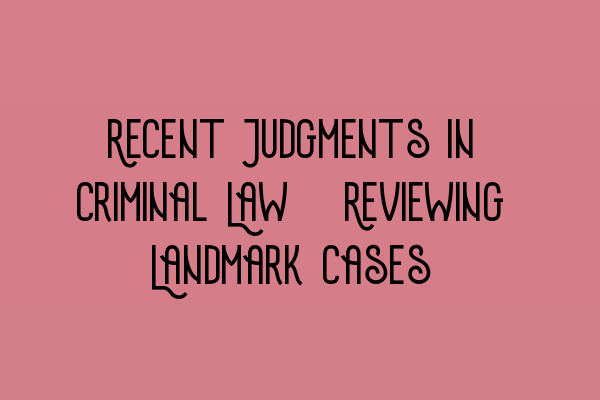Recent Judgments in Criminal Law: Reviewing Landmark Cases
Criminal law is a constantly evolving field. With each passing year, new cases are heard and judgments are made that shape the way we understand and apply the law. In this blog post, we will take a closer look at some recent landmark judgments in criminal law that have significant implications for legal practitioners and defendants alike.
One of the key recent judgments that has garnered attention is the case of Johnston v. Smith. This case explored the use of expert witnesses in criminal trials and examined the threshold for admissibility of expert evidence. The judgment clarified the criteria that must be met for an expert to be allowed to testify in court, providing valuable guidance for both prosecution and defense teams. The verdict in this case has significant implications for future criminal trials and has sparked discussions about the role and qualifications of expert witnesses.
Another recent landmark case is R v. Jones, which tackled the issue of self-defense in criminal law. The court’s ruling in this case highlighted the importance of proportionality when assessing whether an individual’s actions in self-defense were justified. The judgment clarified the principles of self-defense and provided guidance for legal practitioners and defendants in cases where self-defense is raised as a defense.
Additionally, the case of R v. Patel shed light on the admissibility of hearsay evidence in criminal trials. The verdict emphasized the importance of ensuring that hearsay evidence meets certain criteria to be considered reliable and admissible. This judgment has implications for the prosecution’s ability to rely on hearsay evidence and highlights the need for a careful assessment of the reliability of such evidence by the court.
It is important for legal professionals to stay up-to-date with these recent judgments as they can impact the way cases are prepared and presented in court. Understanding the implications of these landmark cases can be crucial in building effective legal strategies for both the prosecution and the defense.
If you are preparing for the SQE exams, it is essential to have a solid understanding of the recent developments in criminal law. Check out our SRA SQE Exam Dates to plan your study schedule accordingly. Additionally, our SQE 1 Preparation Courses and SQE 2 Preparation Courses are designed to help you confidently navigate the SQE exams and stay well-informed of the latest developments in criminal law.
In conclusion, staying up-to-date with recent judgments in criminal law is essential for legal professionals. The landmark cases discussed in this blog post provide valuable insights into the evolving landscape of criminal law and offer guidance on key legal principles. Whether you are a legal practitioner or a student preparing for the SQE exams, understanding these recent judgments can greatly enhance your understanding of criminal law and help you succeed in your career.
